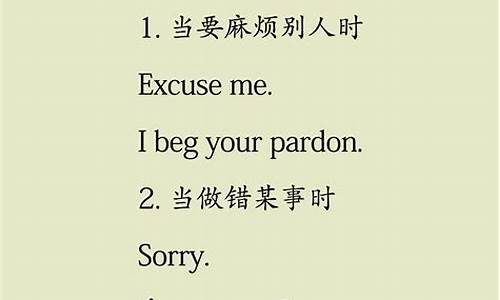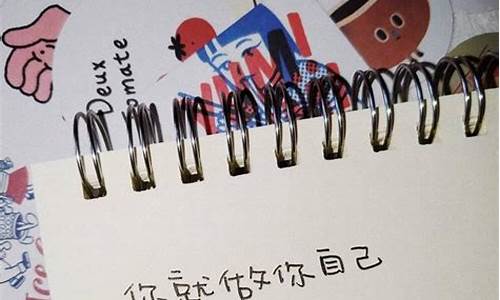您现在的位置是: 首页 > 好词好句 好词好句
回答道歉的英语回答句有哪些句子_回复道歉的英语句子
tamoadmin 2024-09-04 人已围观
简介1.初二英语问题2.爱情道歉英文句子3.英语中回答对不起,谢谢的句子4.跪求 高中常见交际英语英语和回答5.英语中表示最愧疚的道歉的句子是?这里 never mind 是没关系,用于回答上句有道歉意思的句子-Can I open the window?(我可以把窗子打开吗?)-Sure/Go ahead/Certainly...(都有 好的,没问题,就这么做吧...的意思)-Thanks for
1.初二英语问题
2.爱情道歉英文句子
3.英语中回答对不起,谢谢的句子
4.跪求 高中常见交际英语英语和回答
5.英语中表示最愧疚的道歉的句子是?

这里 never mind 是没关系,用于回答上句有道歉意思的句子
-Can I open the window?(我可以把窗子打开吗?)
-Sure/Go ahead/Certainly...(都有 好的,没问题,就这么做吧...的意思)
-Thanks for helping me.(谢谢你的帮助)
-Don't mention it.(别客气)
-I‘ m afraid I can't finish my task.(我恐怕我完成不了我的任务了)
-Don't worry./Take it easy.(别担心,放轻松)
-I he passed my exam.(我通过了考试)
-Congratulations!(恭喜)
-what's wrong with you?(你怎么了?)
-Lee me alone!(别管我!)/Nothing.(没事)
-Would you mind me open the door?(你介意我打开门吗?)
-No,not at all.(一点也不介意)
-Would you want to go to the park with me?(你愿意和我一起去公园吗?)
-Sorry,I’m not in a good mood.(抱歉,我没有心情)
这都是我自己编的,应该没有错。
或者你可以去这里看看,挺好的这个://wenku.baidu/view/2d76f432ee06eff9aef807b0.html
初二英语问题
英语道歉的句子如下:
1、We he all forgotten to do something. Often it can be too late once you remember, which means you are probably going to he to apologize for overlooking the matter.
我们都忘记过要去做某事。通常情况下,一旦你想起来已经为时已晚,这时你就需要为忘记这件事情而道歉。
2、That is what ‘overlooking’ essentially means, to forget or pass over something that needed your attention.
这就是“overlooking”本身的意思,即忘记或者忽略了那些需要注意的事情。
3、Usually, it is not a problem if it is a small thing, but if you he overlooked something at work, this can he much greater repercussions. If this has hened to you, then it is possible you are going to he to apologize to someone, maybe your partner or your boss!
通常情况下,如果忘记的是小事,那没有关系。但是如果你在工作中忽略了一些事情,那将产生巨大的影响。如果这件事情发生在你身上,那你就不得不向别人道歉,这个人或许是你的老板,或许是你的伴侣。
4、Here are ten different ways you can do it.
这里有十种不同的道歉表达。
5、I sincerely apologize for hing overlooked the issue, it was a mistake, and I will make sure it doesn’t hen again.
我忽略了这个问题,为此我真诚地表达歉意,这是我的错误,我保证这不会再发生。
6、Unfortunately, I overlooked the issue, I apologize for any inconvenience I he caused.
不幸的是我忽略了这个问题,我为我造成的不便道歉。
7、Oh no, I completely forgot about it! I am so sorry.
哦,不,我完全忘记了!对不起。
8、Please forgive me; it was an oversight on my part.
请原谅我,这是我的疏忽。
9、I would like to apologize for hing overlooked the matter.
我很抱歉忽略了这件事。
10、Please accept my sincere apologies for failing to take care of the issue. Is there any way I can fix it up?
我没有处理好这个问题,为此我表示诚挚的歉意。请问有什么方法可以补救吗?
11、I owe you an apology for not looking after this matter.
我为没有处理好这件事向你道歉。
12、I am so sorry that I overlooked our meeting the other day, could we reschedule?
很抱歉我忘记了我们的会议,请问可以重新安排吗?
13、I feel terrible and must apologize for any inconvenience caused by my forgetting the issue.
我感觉糟糕透了,我必须为我忘记这个问题造成的不便而道歉。
14、I take full responsibility for hing forgotten to take care of that. Is there anything I can do to make it right?
我为忘记这件事负全责。我能做一些事去补救吗?
15、The next time you overlook something, remember to be honest about your mistake. Be sincere about your apology and explain how you will correct the problem you possibly caused. Doing this is the most effective way to apologize and be forgiven by the person to whom you are apologizing.
下次当你忽略某件事情的时候,对于自己犯的错误要诚实。道歉要真诚,要说明你将怎样补救自己犯下的错误。这样做是最有效的道歉方式,也最容易被别人原谅。
爱情道歉英文句子
1 Journey: 指陆路,海路,空路的旅行,但一般用于有预定地点的较长的距离的陆上旅行.
例如:I am going on a long car journey.(我打算自己开车长途旅行.)
Trip:指任何形式或任何目的的短期旅行.
例如:We are planning to make a day trip to France.(我们正打算去法国一日游.)
2 tourist guide 是旅游指南 tour guide是导游
3 Thank you all the same:同样地感谢你|仍然感谢你|仍然要多谢你!
Thank you all the same.:尽管如此,还是要谢谢你
4 根据主句的来 ,如果主句用的复数,反义疑问句就用复数,单数同理
5 That's all right.”作为常用礼貌用语,主要用于以下这些情景中:
一、作为感谢用语的答语。当你为别人做了好事,别人对你表示感谢时,你常用它来做答语。意思是“不用谢,不客气。”例如:
1.—Thank you very much.非常感谢。
—That's all right.不用谢。
2.—Thanks a lot. 十分感谢。
—That's all right.不客气。
二、作为道歉用语的答语。用于对别人的道歉所做出的礼貌回答。意思是“没关系,不要紧,没什么。”例如:
1.—I'm sorry I'm late.对不起,我迟到了。
—That's all right.没关系。
2.—I'm sorry to trouble you.抱歉,麻烦你了。
—That's all right.没什么。
3.—I'm sorry I broke the cup.对不起,我打碎了杯子。
—That's all right.不要紧。
6 用what ,what做 visit 的宾语,还原为陈述语气 they visited what in HK last month,如果用where,句子没有宾语了
英语中回答对不起,谢谢的句子
don?t worry about it. 别放在心上。你还知道哪些爱情道歉英文句子吗?下面是我为大家准备的一些爱情道歉英文句子,欢迎大家参阅,希望大家喜欢。
爱情道歉英文句子(精选篇)1. i?m sorry for what i?ve done. 我为我的所作所为向你道歉.
2. i shouldn?t he done that. 我不该那么做.
3. i should he asked you first. 我应该先征得你的同意.
4. i honestly didn?t mean it. 我的确不是故意的.
5. i didn?t mean to do that. 我并不想要那么做.
6. i didn?t mean it that way. 事情闹成那样并非我的本意.
7. i don?t know haw that could he hened.
我不知道怎么会发生那样的事.
8. you were right and i was wrong. i apologize.
你是对的, 我错了. 我道歉.
9. it?s my fault. i really feel bad about it.
是我的错. 我真的感到很难过.
10. it?s all my fault. i?ll try to make it up to you.
这事儿全怪我. 我会尽力补救.
爱情道歉英文句子(热门篇)1、The phrase is, regarded as enemies, so changing mood, my heart how can it? - casual, not much, more do not think ill of! I really love you.一语不合,视若仇敌,情绪如此多变,我心怎堪煎熬?语不经意,勿要多想,更忌往坏里想!我是真的爱你。
2、I silence, because I am guilty; I am blind, but also because of my guilt; I trance, also because of my guilt; MY DEAR, I AM SORRY!我沉默,因为我内疚;我盲然,也因为我内疚;我恍惚,还因为我内疚;MY DEAR,I AM SORRY!
3、We start from a friend, I would like to before headstrong crazy.我们从朋友做起吧,我不会再向以前那样任性痴缠。
4、My mobile phone will always open for you, if you are willing to forgive me, please contact me.我的手机会一直为你开着,如果你肯原谅我,随时可以联系我。
5、A I he a crazy heart, waiting for you to forgive! If you don't angry words can you give me a call to let me explain, okay?一个傻傻的我有一颗痴痴的心,在期待你的原谅!如果你不生气了的话能不能给我打个电话让我解释一下,好吗?
6、Remember we used to he a sweet, all disear in smoke gas. This is truly close, nothing could break our love for each other.想起我们曾经有过的甜蜜,所有的气都烟消云散了。这就是真正的亲密无间,任何东西都无法割断我们彼此的爱。
7、The goddess in my heart: sorry! I do it because I love you, love you! I want to stay with you! Please give me a second chance?我心中的女神:对不起!我这样做是因为我喜欢你,爱你!很想和你在一起!请再给我一次机会好吗?
8、A small woman, but I like it. Never to offend you, miss you, miss you, hate you not to chew!小女人一个,但我很喜欢。以后再也不惹你生气了,想你,念你,恨不得啃啃你!
9、Always drunk to call you, let you sad, I was not good. Forgive me?总是在喝醉后给你打电话,让你伤心难过,是我不好。原谅我好吗?
10、Not let me hurt you. I was sorry! I regret! I hope you can give me a chance! Love you forever!无心让我伤害了你。我的心里也不好受!我悔恨万分!希望你能给我一个改过的机会!永远爱你!
11、Perhaps fate, we wouldn't hurt the most reluctant to hurt people, but, believe me, because I love you, let us cherish!也许是缘分,我们都不愿伤害最不愿伤害的人,但还是发生了,相信我,因为我爱你,让我们彼此好好珍惜!
12、Are you hy about your worry, crazy heart, for you to worry about distressed, also once sad heart, can not change heart, do not oversensitive suspicion, most be afraid that you are careless!有你开心省心,对你真心痴心,为你担心痛心,也曾伤心碎心,不敢变心花心,不要多心疑心,最怕你是无心!
13、Everything is my fault, I hurt your heart, I expect you to forgive! I'll love you forever, regardless of past, present and future!一切都是我的错,是我伤了你的心,我期待你的原谅!我永远爱你,不论过去现在和将来!
14、My fault you can forgive? I really involuntarily ah, I hope you understand?我的过错你能够原谅吗?我真的身不由己啊,希望你谅解?
15、Not let me hurt you. I was sorry! I hope you can understand, can give me a chance! To begin to accept me!无心让我伤害了你。我的心里也不好受!希望你能理解,可以给我一个改过的机会!重新开始接受我
爱情道歉英文句子(最新篇)1. excuse me. 请原谅.
2. i?m so sorry. 很抱歉.
3. i?m awfully sorry. 非常抱歉.
4. i?m terribly sorry about that. 为此我非常抱歉.
5. i apologize. 我道歉.
6. my apologies. 我道歉.
7. please forgive me. 请原谅.
8. i hope you will excuse me. 希望你能原谅我.
9. it seems i owe you an apology. 好像我该向你道个歉.
10. you he my sincere apology. 我诚心诚意向你道歉.
11. please accept my sincere apology. 请接受我诚心诚意的道歉.
12. i can?t tell you how sorry i am. 我真的是很抱歉.
13. you cannot believe how sorry i am. 你不知道我感到多么抱歉.
14. words cannot describe how sorry i am. 语言无法描述我对你的歉意.
跪求 高中常见交际英语英语和回答
不用谢
That's All right
It's my pleasure
You're welcome.
My honor.
没关系
It doesn't matter.
That's all right.
No problem.
don't care.
英语中表示最愧疚的道歉的句子是?
Well在口语中的用法
Well是交际英语中一个十分常用的语气词,其主要用法大致可归纳为:
1. 表示惊讶,意为:啊、咳、嘿。如:
Well, you‘ve grown. 唷,你长高了。
Well, who would he thought it? 啊,谁会想到是这样呢?
2. 表示快慰,意为:好啦。如:
Well, that‘s over. 好啦,搞完啦。
Well, here we are at last. 好啦,我们终于到了。
3. 表示让步,意为:好吧。如:
Well, perhaps you‘re right. 好吧,也许你是对的。
Well, it may be true. But I find it difficult to believe. 好吧,这也许是真的,不过叫我难以相信。
4. 表示无可奈何,意为:唉。如:
Well, it can‘t be helped. 唉,这是没办法的事。
Well, there‘s nothing we can do about it. 唉,我们无能为力了。
5. 表示期待,意为:嗯,喂。如:
Well, what hened next? 嗯,后来怎样了?
Well then, who‘d like some coffee? 喂,谁想喝咖啡?
6. 表示疑问,意为:喂,怎么啦?
Well, who was it? 喂,你刚才讲的是谁?
A:Will you do me a four? 请帮我个忙好吗?
B:Well?怎么啦?
7. 表示同意或许诺,意为:好;好吧。如:
Well, all right, I agree. 好,我同意。
Well then, I‘ll call on you later. 好吧,我过一会儿来看你。
8. 表示讲话结束,意为:好;好吧;那么。如:
Well, so much for today. See you next Monday. 好,今天就讲到这里,下周星期一见。
Very well, then. We‘ll talk it over again tomorrow.
好,那我们就明天再讨论吧。
9. 表示重新回到原来的话题,意为:哦;喔;噢;这个。如:
Well, as I was saying……噢,我刚才是说……
Well, the next day……哦,后来第二天……
10. 表示怀疑,意为:是吗?如:
Well, really? 真的吗?
Well, I‘m not sure. 是吗? 我没把握。
11. 表示告诉对方一个新情况,意为:哦;我说;告诉你。如:
A:He speaks very good English. 他英语说得不错。
B:Well, he comes from London. 哦,他是伦敦人。
A:Are you going to Guangzhou? 你是要去广州吗?
B:Well,you see,I no longer work there. 哦,我已不在那儿工作了。
12. 表示要发表自己的看法,意为:嗯,哦。如:
A:What do you think of the film?你认为这部**怎么样?
B:Well, I don‘t think it’s very interesting. 嗯,我认为不是很有趣。
A:Do you like your new English teacher? 你喜欢你们新来的英语老师吗?
B:Well, yes, he‘s very nice. 哦,喜欢,他很好。
13. 表示愉快地接受所发生的不愉快的事(常 oh 与连用),意为:好。如:
Oh well,I can‘t complain; it was my own fault. 好,我没什么可说的,这是我的错。
Oh well,don‘t blame it on him, but on me. 好,别怪他,该怪我。
14. 表示惊奇或感兴趣(此时通常连用两个或三个well),意为:唉呀; 唉唷; 哦。如:
Well,so he‘s the general manager now, is he? 那么他现在已是总经理了,是吗?
Well,well,who‘d he thought he would say such things? 唉呀!有谁会想到他会说那样的话呢?
Well,well,well,I didn‘t think I’d see you here, Sue. 唉唷,我真没想到会在这里见到你。
So what的口语用法
1. 表示不在乎或无所谓,意为:那有什么关系? 如:
A:I‘m afraid it’s too expensive. 恐怕太贵了。
B:So what?We‘ve plenty of money. 那有什么关系? 我们有的是钱。
A:Someone will see you doing it. 会有人看见做这事的。
B:So what?看见又怎样?
2. 用于对别人的质问或责难反唇相讥,意为:那有什么不行的? 那为什么不行? 那有什么了不起? 如:
So I take a drink once in a while,so what?不错,有时候我要喝上一杯,但那什么不可以呢?
A:You‘ve been getting home awfully late recently. 最后你回家非常晚啊。
B:So what?Can‘t I enjoy myself if I want to. 那有什么不可的?如果我想痛快一下,我就不能玩玩吗?
3. 表示藐视别人的玄耀,意为:那算什么?那又怎样? 如:
A:I‘m in the sixth grade now. 我已读六年级了。
B:So what?I‘m in Junior High. 那又怎样? 我已上初了。
A:I‘ve lent her 300 dollars. 我已借给她300美元。
B:So what?I once ge her 3000 dollars at a time. 那又算什么?我曾一次给她3000美元。
4. 用于生气地告诉对方某情况与他们没有关系,意为:这与你有什么关系? 如:
A:Your room looks a real mess,Jack. 杰克,你的房间看起来真是一团糟。
B:So what?这与你有什么关系?
5. 表示埋怨或不相信,意为:你那算什么话?你那算什么理由? 如:
A:I couldn‘t meet you last night because my car broke down. 我昨晚不能来见你,是因为我的车子出了 毛病。
B:So what?You could‘ve at least called me, could you?你那算什么理由,你至少应该给我打个电话呀,是 不是?
6. 有时用于以下这样的语境中:
A:I told him you were busy,so… 我告诉他你很忙,所以……
B:So what? 所以什么?
有时也说成 What of it? 如:
Yes, I wrote it,what of it?不错,那是我写的,那又怎 样?
A:The boy was wearing a red coat. 这男孩当时穿着一 件红衣服。
B:What of it?那有什么关系?What‘s wrong?的口语用法
1. 用于询问对方有什么问题或有什么不顺心的事,意为:怎么啦? 出什么事了? 如:
A:What‘s wrong,Jim?吉姆,你怎么啦?
B:I left my umbrella on the bus. 我把雨伞忘在公共汽车上了。
A:What‘s wrong?你怎么啦?
B:Oh,I‘m just a bit worried about tomorrow. 噢,我只是对未来有点担心。
2. 用于询问某东西出了什么毛病,意为:怎么啦?出什么毛病了? 如:
What‘s wrong with the bus?这公共汽车怎么啦?
What‘s wrong with this clock?这闹钟怎么啦?
What‘s wrong with the engine?It’s making an awful noise. 发动机出什么故障了?噪音这么大。
3. 表示不理解别人的想法或观点,意为:怎么啦? ……有什么不好? ……有什么不对? 如:
What‘s wrong with eating meat?I think it’s natural. 吃肉又怎么啦? 我看没什么不好的。
A:People all laugh at the boy with a red cap. 人们都笑这个男孩戴顶红帽子。
B:What‘s wrong with a red cap?I like red caps very much. 戴红帽子有什么不好?我就很喜欢红帽子。
4. 用于提出邀请或建议,意为:为什么不……?如:
What‘s wrong with a cup of tea?为什么不来杯茶?
What‘s wrong with a game of tennis?为什么不打场网球? Don‘t worry的口语用法
1. 用于安慰对方,意为:别怕;别急;不用担心。如:
Don‘t worry, darling, Daddy’s here. 别怕,亲爱的,爸爸在这里。
Don‘t worry. We’ll find a way. 别发愁,我们会想出办法来的。
2. 用于告诉对方不必做某事,意为:你不必……。如:
Don‘t worry about helping him with it. He will of course do it well. 你不必帮他,他一定会做好的。
Don‘t worry about sorting them out—I’ll do it later. 你不必把它们分类—我以后再分。
3. 用于告诉对方自己一定会做某事,意为:别急;你放心。如:
Don‘t worry. I’ll tell him as soon as he comes back. 你放心,他一回来我就告诉他。
Oh don‘t worry, I’ll get my own back on him somehow!噢,别急,我总会想办法报复他的。
4. 用于回答道歉或类似于道歉的句子,意为:没关系; 请别放在心上。如:
A:I‘m very sorry for forgetting to post the letter. 很抱歉,我忘了寄那封信。
B:Please don‘t worry. 请别放在心上。
A:I made myself a cup of tea while I was waiting. 我在等候的时候,自己沏了一杯茶。
B:Oh don‘t worry. That’s quite all right. 噢,没关系,那当然可以了。Why not的口语用法
1. 表示同意或赞成,意为:好的;可以呀;为什么不可以呢? 如:
A:May I go with you?我可以和你一起去吗?
B:Why not?可以呀。
A:Let‘s eat out tonight. 今晚我们出去吃吧。
B:Yes,why not? 那好啊。
A:I wonder if I could make a living by writing. 我不知靠写作能否维持生计。
B:Why not?那可以呀。
2. 表示劝诱、建议或命令(其后接动词原形),意为:……怎么样? 为什么不……呢? 如:
Why not ask someone else? 问问别人怎么样?
Why not go there at once? 为什么不马上去呢?
A:My girl-friend is in a bad mood. 我的女朋友情绪不好。
B:Why not give her some flowers? 为什么不送她一些花呢?
3. 用来询问原因(有时表示一种不可理解的心情),意为:为什么? 为什么不……呢? 如:
A:He isn‘t going to see her off at the station. 他不准备去车站送她。
B:Why not?为什么?
A:You should not smoke. 你不该抽烟。
B:Why not?为什么?
A:Don‘t touch it. 别碰它。
B:Why not?为什么?
A:It‘s hot!You’ll burn yourself. 那是烫的,你会烫着的。
4. 表示坚持自己的观点、态度或做法,意为:为什么不呢? 如:
A:Are you really going to sue them? 你真的要控告他们吗?
B:Yes,why not? 是的,为什么不呢? now在口语中的用法
Now在口语中经常用来表示说话者的各种语气,主要用来引人注意,没有什么特别的意思,具体含义视上下文而定,大致用法可归纳为:
1. 表示请求或命令。如:
Now listen to me.且听我讲。
No more talking now!别再讲话啦!
2. 表示警告或抗议。如:
Be careful, now. 小心呀!
Now then, what do you mean by that? 那么,你这是什么意思?
3. 表示不耐烦或气恼。如:
Oh,come now! You don‘t mean it. 啊!你得了吧,你不是这个意思。
You‘ve broken that glass;now I told you not to touch it. 你现在把那个杯子打破了,我不是叫你别碰它吗?
4. 表示安慰。如:
Now, now, don‘t cry. 好了,好了,别哭了。
Now then, don‘t worry about it. 好了,别为此担心。
5. 用来引出新的话题。如:
Now then, let‘s read the text. 好啦,我们读课文吧。
Now, just tell us about your trip to Japan. 你给我们讲讲你到日本的情况吧。
6. 用来引出自己的陈述。如:
Now this was bad enough,but worse was to come. 这已经是够糟的了,但更糟的还在后头。
Now, I don‘t know if you’ll agree with this, but I‘d like to make a suggestion. 好,我不知你是否同意这一点,但我还是想提个建议。
7. 表示回到原来的思路或话题上。如:
Well, that‘s settled at last. Now, what was the other thing we wanted to discuss? 好吧,这件事总算定了。那么,我们刚才想讨论的另一件事是什么? Never mind的口语用法
1. 表示安慰,意为:别着急;不要紧;没关系。如:
There,there,never mind! 好啦,好啦,不要紧的。
Never mind,next time I‘m sure you can do better. 没关系,我相信你下次一定会做得好些。
A:We‘ve missed the train!我们错过火车了。
B:Never mind,there‘ll be another in ten minutes. 不要紧,过十分钟又有一趟。
2. 用来谢绝别人的提供,意为:不用啦;别费事啦。如:
A:Can I help you with it?要我帮你做这事吗?
B:Never mind. 别费心啦。
有时用作反语。如:
Never mind saying you‘re sorry,who’s going to pay for the damage you‘ve done? 别说对不起了,你损坏的东西谁来赔?
3. 用来回答道歉,意为:没关系;没什么。如:
A:Sorry to he kept you waiting. 对不起,让你久等了。
B:Never mind. 没关系。
A:I‘m sorry I’ve spilt some tea on the table-cloth. 对不起,我把茶洒在桌布上了。
B:Never mind,it will wash out. 没关系,洗得掉的。
4. 用来否定某一想法或提议等,意为:算了;没什么。如:
Never mind, please don‘t go for it. I shan’t want it. 算了,请不要去取了,我不想要。
A:Do you still want to go to see him? 你还想去看他吗?
B:Never mind. 算了,不去了。
A:What did you say? 你说什么?
B:Oh,never mind. 噢,没说什么。
5. 用来回答挖苦或指责,意为:这与你无关;这不关你的事;这不用你管。如:
A:Do you call yourself a gentleman,sir? 你还自称为绅士,先生?
B:Never mind,sir. 这不关你的事。
6. 后接名词、代词、从句等,表示:不用管; 别介意;别理会;更不用说等。如:
Never mind him,he‘s not serious. 别介意,他是说着玩的。
Never mind who told me,that‘s of no importance. 不用管是谁告诉我的,那无关紧要。
How would he find the time?Never mind the money. 他怎么能找到时间来做这事? 那就更别提钱了。
注:Never mind 是习语,它不能改为:Don‘t mind.
sorry表示普通的对不起
感到伤心的,
觉得难过的,
惋惜的
I
am
sorry
about
your
father's
illness.
对于你父亲的病我感到很难过。
对不起的,
抱歉的;
懊悔的
I'm
sorry
for
giving
so
much
trouble.
对不起,
给你添了很多麻烦。
可怜的,
可悲的
The
world
is
certainly
in
a
sorry
state.
这个世界的现状实在可悲。
可是当你的行为给别人造成的损失或者麻烦
美国人通常说
I'm
sorry。这样的表示更加有诚意更容易让人接受









